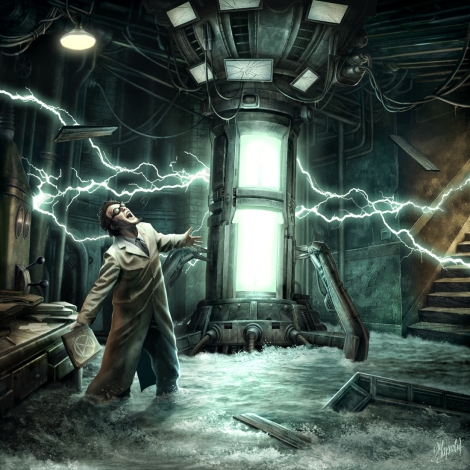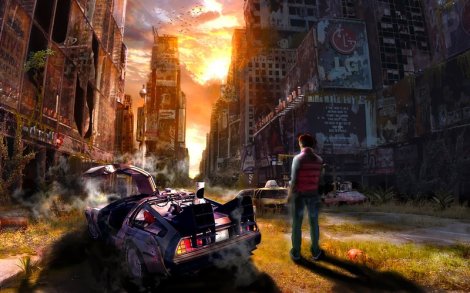Time travel seems to always be tragic.
As I sat in the dollar movie theater watching Looper, I felt torn apart by all the emotions swirling around inside, like a mini typhoon of sobs begging to be let loose. This led me to fifteen minutes of deep thinking and I realized that 80% of all the time travel based movies and books I’ve read have very tragic endings. I came to the conclusion that it will always be so, even in the event that time travel is eventually invented in the future.
How did I come to that conclusion? Well, let’s take a look at some of the more popular time travel movies, books, and even a brief glimpse at humans as a whole. Please note that this is not to say that every single time EVER will there be tragedy; it’s just an exploratory look at tragedy in popular culture regarding time travel.
The Butterfly Effect and Looper seem to be cut from the same cloth, albeit with very different executions. Both show, in sad detail, what could transpire as you try to change your own timeline in the hopes of bypassing a harsh future. Instead, the more and more you change things, the worse things end up being. It’s only when you remove yourself from the equation, or accept that some things are meant to be, do things right themselves. Is this self sacrifice? Not quite sure. I feel that these two pictures detail most accurately how people would react to time travel, were it introduced in society. Even if most of us were to adhere to guidelines, particularly those aimed at us not erasing ourselves, someone would go back in order to fix their lot in life, save that special someone, etc. We are only human.
I picked up several books in my attempt to research this further, among them The Time Machine and A Wrinkle In Time. We’re all familiar with the plot of The Time Machine, yes? If not, it revolves around a scientist who travels to the future where he falls in love with a member of the Eloi, a dainty strain of human, before losing her to a fire before liberating his time machine from the predators of the lands and traveling again even further into the future, watching the universe come to an end before returning to his own time. His exploration is tinged with sadness at the inevitable demise of everything and sets about packing for another time traveling trip. Because this is where the book ends and it’s up to you to fill in the rest, I always felt like he couldn’t go back to being a regular scientist in his time; he’d seen too much. How hard it must be to return to mediocrity and well, normalness, after experiencing the things he did.
A Wrinkle In Time, while not quite so introspective, dealt with children of a scientist who created the tesseract (basically a wormhole) that can be used to travel through space and time, albeit with many dangers. The discovery of the tesseract has taken the patriarch of the Murry family and an absent father spurs his children to do something worthwhile alongside alien friends. It’s a very real sense of loss as you get to know the Murrys and realize that their father has been absent for quite some time and the effect on everyone is nothing to dismiss easily.
Sobered by my reading, I turned my sights toward movies. Surely the Arnold Schwarzenegger turned cyborg assassin T-800 would bring smiles to my face as I mouthed along “I’ll be back.” Nope. My childlike brain remembered a very different movie apparently. Sure, the plot was the same: The Terminator goes back in time to kill Sarah Connor, future mother of John Conner, leader of the resistance against Skynet. All fine and dandy. What I failed to grasp as a kid was the super sad loop of time happening in Sarah Connor’s life. If only Kyle Reese hadn’t tried to save her (but he had to try, in order for the time stream to continue as it was supposed to). If only a T-1000 wasn’t sent back in time to correct the mistakes of T-800 (but it had to be done so things unfolded as they should have). If only Terminator 3: Rise of the Machines had never been made.
I was going to write about Doctor Who, because no time travel theorizing cannot be complete without including the last Time Lord, but I couldn’t stop the tears from coming, so I chose Back to the Future instead! This time (no pun intended), we have an incredibly intelligent scientist who knows what will happen if the time stream is messed with. He goes to extreme lengths to pass on detailed instructions to the main protagonist Marty. To be fair, Marty accidentally changes time, but the good Dr. Brown still insists on not messing with the time stream, even when it means saving his own life…but we see how that ended up!
What was my point here? Well, I spoke with several of my friends, peers, fellow science fiction readers to see if they felt as I did: could a story based on time travel end in happiness? I’ve come to the conclusion that sure, it might work out well for the main character, but what about the other people? Does selfishness win out instead of maintaining a world balance? Something to think on, dear readers.
What would you do if given the chance to time travel?
Leia Calderon
Editor
@ladyvader99


















I don’t know aboot ending, but check out “Safety Not Guaranteed”. Their adventure starts out pretty happily.
I will check it out!
I’ve always believed that time travel solves all the problems that it doesn’t create. Star Trek deals with temporal mechanics as they call it, in several episodes. I wrote of the irony of time travel on I think my blog here, unless it was at http://my168project.com I don’t remember….
I was going to include Star Trek in this article, but I couldn’t stop with the colorful accolades long enough to make it fit properly ^_^ it did a wonderful job and now i want to watch it again!!